#inner narrative
Text
ADHD & self-limiting beliefs
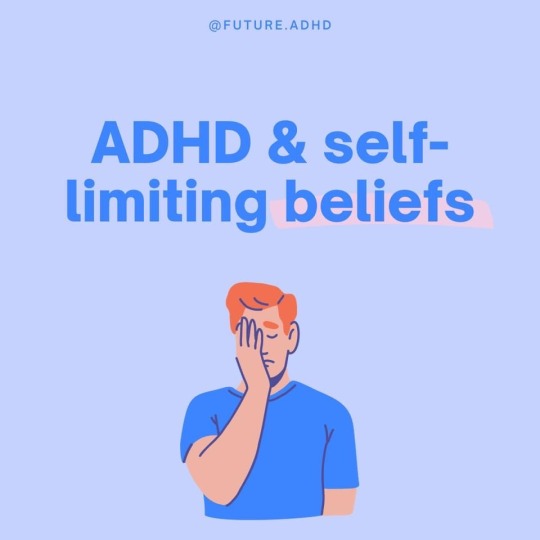

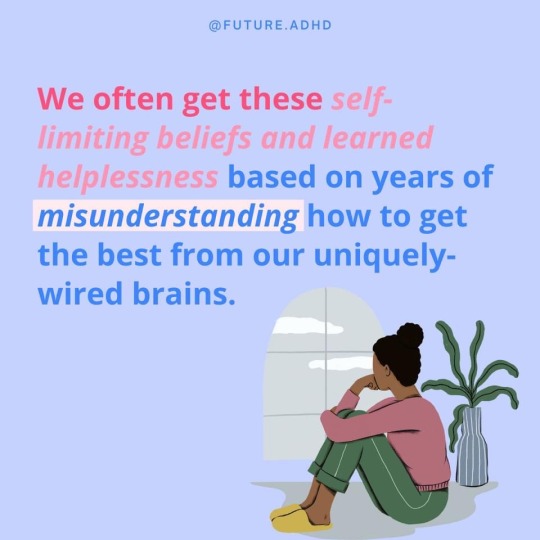

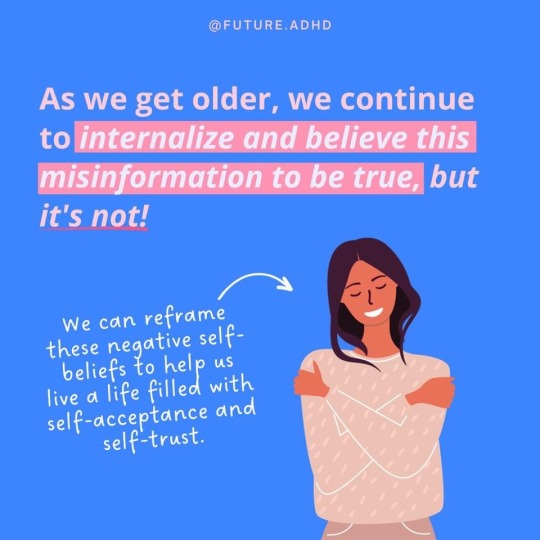
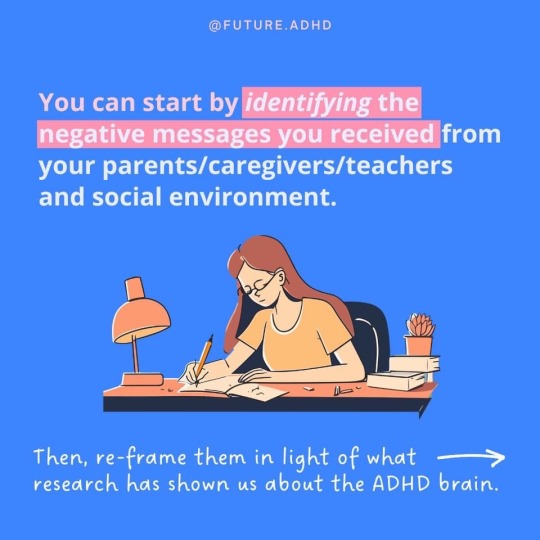


Future ADHD
#adhd#adhd post#adhd and self-limiting beliefs#inner narrative#gaslighting#mental health#adhd problems#adhd things#adhd struggles#neurodivergence#neurodiversity#actually neurodivergent#feel free to share/reblog#Future ADHD (Facebook)
171 notes
·
View notes
Text
Book of the Day - Choose Your Story, Change Your Life
Today’s Book of the Day is Choose Your Story, Change Your Life, written by Kindra Hall in 2022 and published by HarperCollins Leadership.
Kindra Hall is President and Chief Storytelling Officer at Steller Collective, a consulting firm focused on the strategic application of storytelling to today’s communication challenges. She is one of the most renowned keynote speakers, today.
Choose your…

View On WordPress
#Book#book reader#book recommendation#bookstagram#booktok#Growth#improve your life#inner critic#inner narrative#Kindra Hall#Raffaello Palandri#self improvement#Storytelling
7 notes
·
View notes
Text
To Those Reaching Out
To Those Reaching Out
I have been so overwhelmed with Jehovah’s Witnesses from my past reaching out. I’ve pinned this to my social media accounts. I’m really surprised that I have heard from those in my past. It’s sad and really heart wrenching for me. I want it to stop unless it’s sincere.
To all my Jehovah’s Witness family and friends who have been trying to contact me recently:
It’s been overwhelming to hear from…
View On WordPress
#Belief System#Critical thinking#Cult#Deconstruction#Emotional Healing#Emotional Impact#Emotional support#ExJehovahsWitness#exjw#Family dynamics#High-control group#Identity negotiation#Inner Narrative#Jehovah&039;s Witnesses#JehovahsWitnesses#Kindness#Leaving a cult#life#mental health#Personal freedom#Personal Growth#Professional help#Psychological support#Religious Beliefs#Religious Deconstruction#Religious Trauma#Religious upbringing#Self-Discovery#Self-reconstruction#Therapeutic Writing
0 notes
Text
Oh hello there, who’s this?
I am not supposed to hear such things
I’d like if you returned your thoughts
Every last one of yours out of my brain
But I guess
Hold on,
I, I, I heard everything
And I promised I wanted it all gone
But
I’ll keep the memory of
the jay,
And
Thinking being in the cold
Would make you appreciate your own warmth
For intruding where I don’t belong
So they. The two. Belong.
#original poets on tumblr#poetry#poem#original poem#female poets#memories#lyrical poem#prose poetry#writing#what is being#inner thoughts#inner narrative#narrative#mind reading#chance
0 notes
Text

Togachako but happy ‼️
#my art#fanart#bnha#mha#bnha fanart#my hero academia#boku no hero acedamia#himiko toga#ochako ururaka#togachako#wlw art#healing my inner middle schooler by drawing them good :)#just. when they’re narrative foils >>>#and have so much unexplored character#just. yeah :)#anyways I drew them but like no uniforms high school era yipeee
1K notes
·
View notes
Text
imagine writing this. imagine writing percy increasingly losing himself to his anger and his resentment, sympathizing with Luke, spiraling, being immensely powerful, burning away at his mortality, and not knowing how to deal with any of it. Desperate for help and the one time he breaks down enough to try and get it (Jason) his worst thoughts and perceptions of himself are inadvertently affirmed. He never talks about it to Annabeth. He never talks about it to his mom. Oh but everyone is aware of it. Aware of his anger. Afraid of his anger. Concerned for him and by him. They give each other looks, worried, because they recognize what a danger he could be — to himself, to others, to the gods. But no one says anything, at least not to Percy. No one helps him. No one intervenes. They don't know how to, it seems. (Or maybe they're afraid to). And so they all pretend everything is fine. Percy pretends, bottling it all up inside until the pressure gets too great and that anger boils over and he loses it all over again. He's so desperate for normalcy that he'll take anything, believes in all of the sweet, sugar-spun tales of New Rome and looks away from the rotting underside. He lets himself believe that once he's there the gods will have to leave him alone, because he's done with it all, he's retired (and the gods always keep their promises don't they?).
Imagine writing what is arguably the well-plotted, compelling, and tragic beginnings of a fallen hero arc for percy and none of it being intentional.
RR's penchant for Percy to be explosively angry and scarily powerful, alongside characterizing him as jaded and resentful and desperate, mixed with his refusal to write any in-depth emotional resolution to any time Percy snaps has created an enthralling narrative of a hero just about to fall from grace. and it's all seemingly an accident.
Oh, and another, amazing, unintentional coincidence? if you're taking RR's word that Percy is still 17, that's also the age Luke was when he failed his quest, marking the beginning of his fall as a hero. Like. The narrative parallels are all there. And without any meaning for them to be.
#I cannot even begin to fathom the inner workings of RR's mind.#he's set up a fallen hero masterpiece and he doesn't even know it like ??? its amazing its astonishing its insane#like I cannot imagine writing a Percy Snaps narrative so cohesively and to this level without some level of intention#and yet#here we are#OR he is aware and is too much of a coward to follow through with it#so then percy's character is just stuck in this limbo of constantly being one more bad meltdown away#from reaching the point of no return#which is just unsatisfying for everyone involved#screaming crying ripping my hair out#pjo#percy jackson#mine
771 notes
·
View notes
Text
I think the way Sarah J Maas depicts Tamlin’s abusive traits are indicative of the simplistic understanding she has when it comes to depictions of abuse. Even when the text views Tamlin as irredeemable for his actions, it still strangely gives him an out by bringing magic into it. By having his magical outbursts be involuntary (and have little evidence to challenge that notion) she makes abuse seem like the accidental result of uncontrollable emotion as opposed to deliberate tactics of control.
This is why she can’t clock the irony of Rhysand presenting a compelling case of covert abuse, because she doesn’t have the imagination to consciously write an emotionally abusive or controlling dynamic.
#I think Tamlin is treated unfairly#to be clear I’m not even really convinced by the idea that Tamlin is an evil abuser#it just seems like the abuse narrative just…isn’t good enough to convey it#anti sjm#acotar#anti acosf#tamlin#sjm critical#anti inner circle#a court of thorns and roses#anti rhysand
249 notes
·
View notes
Text






Sorry. You think you're a demon? With your curly little... and your neat white... I'm a fallen angel! I lied. To thwart the will of God. Well yeah, you did, but I'm not gonna tell anybody. Are you? No. Then nothing has to change, does it?
#goodomensedit#goedit#good omens#ineffable husbands#crowley#aziraphale#userbecca#ughmerlin#tusermyra#jameszmaguire#good omens spoilers#flashing gif /#edits#i had to add this clusterfuck of overlays to make the coloring work#bright scenes my worstie#but anyway this quote makes me feral and the constant parallels in the narrative are feeding me so well#rs: hereditary enemies#the fact that crowley knows him and his nature#and doesn't begrudge him for it even when it hurts them both#aziraphale's inner conflict is really one of the greatest themes on the series to me#he cares so much it sometimes blinds him
624 notes
·
View notes
Text
Honestly we could REALLY get into the fact that a lot of the insanity in Acotar is an excellent exercise in why you can't really separate the art from the author.
Sjm's zionism is OBVIOUS in the text. The ic destabilize governments to the detriment of people they will never have to care for, steal artifacts from other countries, displace people, cause invasions, commit war crimes for 50 years "for the greater good" all while their own people are living under unchecked brutality and poverty.
They are rich megalomaniacs that care for no one but themselves and their own emotional and material satisfaction and they are PRAISED for it. In fact anyone who even remotely disagrees with the IC is almost always one of the villains in the story (Beron, Tamlin, etc) as if to condition the reader that asking questions that are critical of the IC puts you on the wrong side of the narrative morally.
All of that sounds REALLL familiar huh?
#and the funny thing is sjm brought this on herself#unlike most authors she creates a clear framework in the text of what the narrative considers morally right and morally wrong#and her characters are always in the side that is morally right in the books but is morally abhorrent in real life#you have NO CHOICE but to question the actual author atp#like if the ic were real they would be the gop#and i think its funny that a lot of the havoc they wreak is most centered on people that are poc or marginalized in the book#but im supposed to get behind it because its some white teenager having a girl boss colonial moment#i hate these novels#if sjm wanted to do this she should have straight up just made feyre and co villains#anti sjm#anti acotar#anti rhysand#anti feysand#anti ic#anti acomaf#anti sarah j maas#anti inner circle#anti acowar
335 notes
·
View notes
Text
I've come to the conclusion that being assigned the fandom-mandated "sunshine character" is the worst possible fate a character could face
#maybe I'm just biased because the characters that this happens to tend to be some of my favorites but I think I'm onto something#these characters aren't allowed depth of emotion or complex inner worlds. once a character is fanonized as the 'ray of sunsine'#or the 'cinnamon roll' they cease to occupy any space outside of that role in fanon content. they're happy & silly & not much else#no matter how much depth they may actually have in canon.#popular fanon has a tendency to treat happiness & goodness like states without any emotional complexity.#emotional complexity is reserved for the anti-heroes & jerks-with-a-heart-of-gold you see.#atp 'X is a ray of sunshine' has begone to feel like code for 'I don't actually care about this character very much nor do I understand#their canon narrative so I'm just gonna ignore them 98% of the time. but hey they're really nice! that's something! anyways���'#this is about many characters but I particularly want to call out aang & nightcrawler / kurt wagner as two who get this the worst.#because christ the mischaracterization they get from people who never think about them outside of the 'uwu small bean' box is infuriating#also steven universe & miles morales. although it's not so bad for steven after suf#fandom bs#please pretend I typed 'begun' a few tags back
190 notes
·
View notes
Text
Do you ever think that the reason Nesta was waiting for her dad to do something was because she went to him after being abused by her mother and grandmother and he did nothing. So when he still refused to step up and protect them it felt like it was replaying what happened before and that’s why she was bitter and refused to ‘help’ — she wanted him to, you know, like a father.
#yes I said abused#pro nesta#nesta acosf#nesta archeron#anti inner circle#anti this narrative that Nesta had to step up instead of the actual adult in the room#anti nessian#acosf#acotar#acofas#acomaf#acowar
114 notes
·
View notes
Text
#KCStrong
This photo tells a story. It tells a story of the bravery, courage, justice, and resilience of the people of Kansas City. We are strong, we are united, we are just, we are resilient.

View On WordPress
#Belief System#chiefs#chiefsnation#Emotional Impact#Emotional support#Inner Narrative#kansascity#kc#kcmo#Kindness#life#mental health#nfl#Personal freedom#Professional help#Super Bowl#SuperBowl
1 note
·
View note
Text

Dead wife CXS (version 2.0)
#link click#shiguang dailiren#link click memes#my meme! I just improved on the first version of this#had to include golden sunlit CXS…#nooo don’t be doomed by the narrative you’re so sexy aha#(lu guang’s canon inner thoughts)#shiguang#no but for real…how are they this gay#link click spoilers#cheng xiaoshi
120 notes
·
View notes
Photo
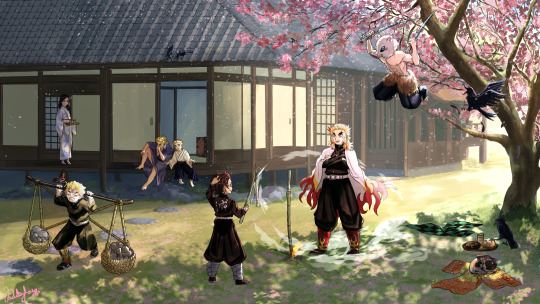
💪 Training with Rengoku! 💪
Watched the movie recently and drew this to console myself afterward lol. AU where everything is finee, nobody dies and they’re a perfectly happy functional family~
#demon slayer#kimestu no yaiba#mugen train#rengoku#tanjiro#zenitsu#inosuke#senjuro#shinjuro#ruka#kyojuro#mugen train spoilers#me: *sobbing* oh yeah ok this is a tragic yet narratively- essential major chracter death i can accept it#inner fanartist: hahaha no#*squidward voice* we serve fluff here sir#my art
2K notes
·
View notes
Text
Please stop calling them Morally Grey, they are just dickheads
No one from the Night Court is morally grey. Their actions are horrible, the narrative justifies them.
Feyre destroys The Spring Court, leading to the destruction of the Summer Court, and the only two people who say something against this are the HLs of those courts, but even then, they don't put up much of a fight. Tarquin, after being disrespected in his home, goes to the HL's Meeting and says "Well, the Night Court were the only people who came to help," as if the High Court wasn't the reason his people were attacked. The narrative does not allow Tamlin any breathing room to make his point, right or wrong, instead, the rest of the people on page opening disregard his opinions (which is insane to me because they were his friends longer than Feyre had been alive, and they just take what Feyre says at face value.) Instead, no one speaks when Rhysand magically violates Tamlin's autonomy and shuts him up. No one spoke when Feyre and Azreal were whooping people's asses, despite the NC saying they wouldn't do it before the meeting, and the literal HL of Dawn putting wards on the room for no magic use (which, again, how were they able to use magic to attack people).
Feyre scrambled the minds and implanted thoughts in the heads of the guards in the Spring Court to destroy it and she never looked back on it for more than three seconds and went "huh, that was weird. It wasn't smart to do that because the wall is literally pressed against the Spring Court's ass..." No, everyone pats her on the back for her work. Lucien brings up briefly his discomfort being used as a pawn in Feyre's game and that she single-handedly destroyed his friendship with Tamlin, that older than Feyre had been alive, and the narrative doesn't even have her linger on that thought for more than one second. The narrative is quick to call out people who treat Feyre and the rest of the IC poorly, but never calls out them treating everyone else poorly. The narrative justifies the pimping of Feyre and her physical abuse by Rhysand (twisting her arm to make her agree to the bargain) as a necessary evil but does not extend the same grace to Tamlin, who did what he did as a necessary evil.
Trauma is understood when the person traumatized is the Night Court but never with anyone else. They constantly go back to dogpile on Tamlin, and the narrative doesn't have a single person stop and say, "Yeah, we should leave him alone." In fact, during FAS, after Rhysand tears into Tamlin, he goes back to Feyre, and she says, "You are always a bigger man" I refuse to say male. This is after Feyre writes to him and says, "Thank you for your help, I hope you find happiness too" and it is known that this man is so depressed that he is in his beast form. He does not have a kingdom anymore. Also, no one told Rhys to go to the Spring Court and harass him. One could say that the things the IC did could be from the perspective of Feyre and thus justified, but when we move to Nesta and Cassian's perspective again, nothing is challenged.
Nesta says that the only reason she hates Rhysand is because he is smug, not because of how he treats her. Nesta was threatened because she, albeit not in the kindest way, told Feyre that she was going to die in childbirth, and while Feyre said it wasn't right, there is nothing longer than a paragraph about the whole situation. It was just over as soon as it started. Nesta gets locked in the house for God knows how long (which, again, doesn't make sense because if she could get down the steps, get tired, and come back up, she should be able to make it all the way down the steps. Walking down the steps isn't what tries people out, it the coming back up because you are going against gravity) and no one thinks, "Hmm, that is exactly what Tamlin did to Feyre." They both locked someone in under the guise of protection. Cassian sees how the IC is treating Nesta, and while he tries to say something, he is always shut down.
And I will close on this. In an interview a few years ago, SJM said that Rhysand was a gift to her and that he could basically do no wrong. She also mentioned that the reason why Nesta was mad at Feyre and Rhysand was because she was jealous of their perfect life. This, my friends, is not how you write a story. This is an example of Authorial Fiat. You may say, "it's just a fantasy story" and I will say "Shut up, we know. I don't know how told tell you this, but: stories have to make sense."
#anti feysand#anti inner circle#inner circle#anti acotar#indie author#writing#anti rhysand#anti sjm#feyre acotar#acotar#anti acomaf#morally grey characters#they are seriously the worst type of people#narrative bais#authorial fiat#critical reading#fantasy romance#storytelling
142 notes
·
View notes
Text
There’s a problem with the way Sarah J Maas depicts physical abuse/intimidation in ACOTAR
The fact that Tamlin’s physical abuse of Feyre being communicated through a magical/emotional outburst is problematic in the sense that it undercuts the reason why abuse happens. Incorporating magical concepts into a portrayal of domestic violence muddles the issue at hand and makes the abuse an accidental consequence of involuntary magical impulses as opposed to a deliberate tactic of intimidation and control. This issue is exacerbated by the fact that Feyre too, experiences an uncontrollable magical/emotional outburst during the High Lords meeting due to Beron’s provocative remarks. To be clear, I don’t view Tamlin as detestable or as an irredeemable abuser, but the text very much does. What I want to comment on is the problematic framing of Tamlin’s actions that are meant to characterize him as an abusive partner to Feyre.
So, I’m going to compare and contrast a scene from ACOMAF with a scene from ACOWAR, both of which depict magical outbursts that are brought on by intense emotional stress or rage.
ACOMAF
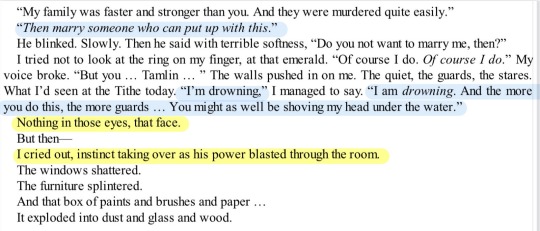
Here, Feyre objects to Tamlin’s protective measures he had enacted earlier. She expresses how suffocated she feels and how she wishes that she had the breathing room to cope with her new reality and that Tamlin’s actions are making her suffer. Furthermore, Feyre introduces her doubt in their engagement and expresses her reservations. Tamlin then goes blank, reacting explosively with his power blowing the room into splinters.
This is a good first step towards characterizing Tamlin as an abusive partner (despite the leaps it took to get there) But, where it goes wrong is the emphasis the text puts on Tamlin's blank expression and subsequent magical response. He loses control momentarily, but the issue about this portrayal is that abuse is not "losing control" or accidental, it is a conscious decision made by the abuser. But here, Maas makes it seem as though Tamlin really was not in control, that the heightened emotions made him react that way.

It gives Tamlin an out and consequently undercuts the message Maas is trying to communicate. Bringing magic into the scene takes away Tamlin's agency and removes a portion of his culpability in harming Feyre.
This scene should not have been Tamlin simply losing control of his temper, if Maas wanted to enhance her abuse narrative, she should have taken Tamlin’s temper and had him weaponize it. Intimidation is a possibility, one that would work towards making Feyre feel scared about voicing ver true feelings on their relationship. But Maas doesn’t go all the way, she doesn’t lean into that interpretation and instead plays it straight.
This is also undercut by Tamlin's second magical outburst in ACOWAR. Feyre intentionally provoking him does nothing for Maas's abuse narrative and actively undermines it by strengthening the idea that Tamlin's destructive outbursts really were caused by overwhelming emotions. Once again, it gives Tamlin a way out and dilutes the message.
The notion of an involuntary magical outburst is applied again in ACOWAR

Beron’s inflammatory remarks provoke an immediate reaction from Feyre, she goes blank so to speak, and can no longer focus due to the intensity of her emotions. This manifests in a fiery outburst that throws the meeting into disarray and injures the Lady of Autumn accidentally.

She’s so angry that she can’t think straight or logically, and it manifests in an attack. Though this isn't exactly the same, Feyre's "blinding fury" is so powerful that it cannot be restrained and ends up harming an innocent party. This moment strengthens the case for magic manifesting strong emotions as external attacks, characterizing it to some extent as involuntary.
Ultimately, the magical element removes the agency of the individuals in question. It frames their violence not as a conscious act designed to inspire fear, but as a genuinely accidental reaction to intense emotions. This is why the "Tamlin is an evil abuser" narrative is so weak. Because it dilutes the severity of the violence and makes it seem as though these kinds of emotional outbursts are an element of possessing magical powers. It gestures at a larger issue of Maas picking and choosing when and where she wants to apply real-world standards to her characters' morality. It makes events less believable and hypocritical, making allowances for certain characters, but condemning others without adequate narrative set-up.
This is why Maas is fundamentally incapable of recognizing the abusive dynamic she constructs with Feysand. It is a combination of double standards, authorial bias and a misunderstanding of how abuse manifests.
#sjm critical#Even when Maas hates a male character and bashes him constantly she still offers him a shred of plausible deniability due to the magic syst#I just think that Maas does a terrible job of writing a coherent abuse narrative#Acowar#acomaf#acotar#anti sjm#acomaf critical#tamlin#feyre archeron#anti rhysand#anti inner circle#acotar meta#acotar critical#anti sarah j maas#not a Tamlin hater
194 notes
·
View notes